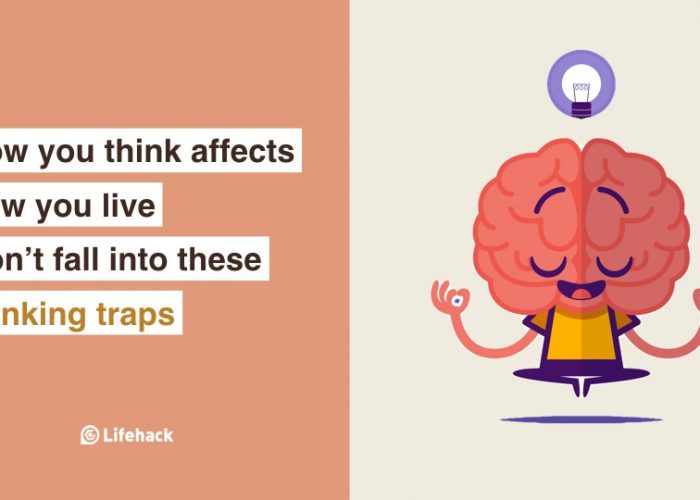



When negative emotions come up it’s best to not let them influence our thoughts.
YOU may think thoughts are inconsequential – coming and going in a sometimes meaningful or meaningless way. But the thoughts we have and the way we think are more substantial than you may realise.
Getting into patterns of thought and creating different beliefs essentially shape our lives and our outlook on ourselves, how we perceive others and the world around us.
We can choose to think positive or negative thoughts on any given subject but, as humans, our tendency is to go straight to the negative which can have a detrimental effect on our mental strength.
Making a conscious effort to notice our negative thought patterns and stopping them, takes great habit but it’s not impossible. It can be hard to undo a lifetime of thinking. But if you do find your thoughts are erring on the side of negative ask yourself, you should ask yourself: are they really benefiting me?
Here I’ll be going through 10 thinking errors and why they aren’t serving you. See if you identify with any of them and make today the day you start thinking differently.
We create core negative beliefs through overgeneralising but the reason we do this is because it’s easy to fall into the trap. If we failed badly at something then we apply that belief to every time we attempt that thing again and more. Say you were in a relationship where the other person cheated on you or treated you badly – overgeneralising would be to believe all men (or women) cheat or that you’ll always be treated badly in relationships.
Don’t push the outcome of one contained situation onto other areas of your life.
Have you found that if one thing goes badly in your day that’s all you can focus on? We tend to choose to ignore and filter out any positives even though they massively outweigh that one negative.
Try and make a habit of picking out and focusing on all the positive aspects of the day whether it was your smooth commute to work, your partner bringing you a cup of morning coffee, the delicious lunch you had – decide to look at these things and conclude that positivity is all around you. Don’t ruin a day by focusing on a single negative.
It’s natural to feel like the world revolves around us but sometimes our thinking can cause us to only see things from our perspective and how we feel about a situation. If someone at work is short with you, you suddenly assume you’ve done something wrong. If your friend doesn’t text back straight away, then she must be angry at you for some reason.
But most of the time it’s nothing to do with you but more to do with them. Don’t be so quick to make it about yourself and understand other people are going through different negative emotions that aren’t related to you. When this kind of situation happens, make a point of realising that other factors could be influencing another person’s reaction.
When negative emotions come up it’s best to not let them influence our thoughts. But it’s very easy to believe the connection our mind makes with our negative emotions – if you feel you’re a bad person, it doesn’t actually mean that you are. If you’re feeling down and conclude you’re a loser, this doesn’t mean you are a loser!
Ride out any emotional reasoning and put it down to a blip – don’t make conclusions about yourself as a result of them.
Negative expectations can cause us to think the ‘what if’ questions. If I quit my job what if I don’t find another one? What if I hate the new job? What if I hate the people I work with? And of course, this kind of thinking can stop us from making decisions we probably deep-down want to make. This is magnifying a situation in an unnecessary negative way.
On the other end of the spectrum, we can also minimise things especially positive and desirable aspects of ourselves. Both are detrimental to living our life in a confident and real way.
Everyone sometimes makes assumptions about what others’ perceptions are on any given topic. But we can never really know what’s going on in someone else’s mind. If you have the tendency to believe people think badly or negatively of you then remember that most people are too busy worrying about themselves to truly care what you’re wearing, saying or how you act. Don’t put so much emphasis on assumptions.
Sometimes it’s easy to think things are either one thing or another, in other words, all or nothing – good or bad. But this kind of limited thinking filters out all the shades of grey.
By doing this you don’t see every aspect of something – for example, if every project is a success or a failure then you can’t see the opportunities to grow or better any mistakes along the way that may lead to a completely different idea or direction. Remember the world is multi-faceted so make your perspective the same way.
Society has made us feel we need to live our lives in a certain way. A lot of the time we make decisions because we feel we should but who exactly is saying you should? Is it based on a set of rules made by other people? Is it because your family expect it of you?
Next time you feel yourself saying you should do something despite it making you unhappy, question why. Make up your own ‘shoulds’ that are based on what makes you happy.
When we have negative emotional reactions we can easily push the blame on to others. But only we can be held responsible for how we react to people and situations. Don’t hold other people responsible – no one can make us feel the way we feel except us. Once you get to grips with this, it can not only be empowering but greatly improve your relationships with others.
This is a hugely common trait in many of us. How many times do you feel frustrated that someone has a different opinion or perspective than you? That constant need to prove that you’re right and they’re wrong is a mindset that can be changed.
Understanding that everyone is going through life with different challenges, experiences and perspectives is what makes this world an exciting place. Be cognisant of how others feel when voicing your opinion and respect theirs. Don’t feel like you always have to be right because sometimes you just might not be.
So remember, the way we think has far more influence on the shaping of our lives than you may realise. Changing negative thought patterns is a huge step towards creating a more positive mindset and outlook for the benefit of yourself and others. – By Jenny Marchal